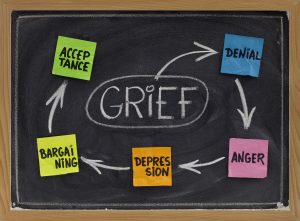
07 Aug Overcoming The Loss of a Loved One
Grief and loss are important parts of the human condition and experience. They will affect everyone at some point in their lives. How each person deals with grief and loss is unique, but there are some commonalities in the process. When you have a family member or loved one in hospice care, you are confronted with the realities of this loss. Dealing with that grief in a healthy way is important for your physical and mental well-being. While there is no one right way to deal with grief and loss, you can take steps to identify your feelings and consider the options you have.
The Stages of Grief and Loss
 Psychologists have attempted to simplify the process of grief into five basic stages. Sometimes this gives people the wrong impression, so it is important to define what these stages mean. Grief is a process. It may not have distinct steps, and it may not happen in any particular order. As you examine the stages discussed here, keep in mind you may experiences them out of order, more than once, or skip some of them entirely. It is best to approach them as a template for understanding.
Psychologists have attempted to simplify the process of grief into five basic stages. Sometimes this gives people the wrong impression, so it is important to define what these stages mean. Grief is a process. It may not have distinct steps, and it may not happen in any particular order. As you examine the stages discussed here, keep in mind you may experiences them out of order, more than once, or skip some of them entirely. It is best to approach them as a template for understanding.
Overcoming Denial and Isolation
Denial is usually the first response or reaction to the loss of a loved one or news of one’s impending death. A person will deny the facts and refuse to face the reality of what’s happening. This is a normal reaction and defense mechanism. It protects us from the initial pain and shock of the news.
While some denial is normal, it becomes problematic when people reach a point of emotional refusal. Long term repression can lead to a variety of serious health conditions, including physical.
There are many ways to overcome the initial denial. Sometimes we are forced to face what is happening. There may be financial or legal decisions to be made. One benefit of hospice care is that it gives both the patient and their family time to work through the process in a peaceful, stable and supportive environment. It is possible to remain in a state of denial for a very long time. You may continue to hope or assume your loved one will recover.
One thing you can do to move through this stage is be mindful of the emotions that come. Recognizing they exist is the first step to accepting and dealing with them. Such mindfulness is a skill that may take some practice or guidance. Find a quiet place and examine your feelings without judgment or pressure. Allow yourself to experience your true feelings. Accept that those feelings exist and that it is okay to feel them. At this early stage, you don’t have to process through these emotions or look for ways to deal with them. That will come later. Simply allow yourself to feel what you are feeling.
Dealing with Anger and Resentment
 People commonly feel anger when experiencing grief or loss. This is another early defense mechanism meant to protect us from real feelings of pain. Anger can sometimes be expressed or felt in ways that don’t make sense. You may get angry over small or everyday things that aren’t even connected to your loved one. You may even express anger toward your loved one. You may resent that they are leaving you, giving up or not fighting harder for life. This may lead to a complicated mix of shame or anger at yourself. This anger is real, although it may not make sense. Once you acknowledge that anger, you can move past it and uncover the true painful feelings it hides.
People commonly feel anger when experiencing grief or loss. This is another early defense mechanism meant to protect us from real feelings of pain. Anger can sometimes be expressed or felt in ways that don’t make sense. You may get angry over small or everyday things that aren’t even connected to your loved one. You may even express anger toward your loved one. You may resent that they are leaving you, giving up or not fighting harder for life. This may lead to a complicated mix of shame or anger at yourself. This anger is real, although it may not make sense. Once you acknowledge that anger, you can move past it and uncover the true painful feelings it hides.
Bargaining
Your loved one is very sick and is going to die. This creates a loss of control. You feel vulnerable and powerless. This triggers yet another defense mechanism commonly referred to as bargaining or rationalizing. You may consider that you need a second opinion, or third or fourth. You may berate yourself for not seeking help or treatment sooner. The flood of “if only…” thoughts dominates your mind. These are all attempts to regain control over a situation you will never be able to control.
Getting through this stage can be difficult. It helps to talk through your thoughts with a friend or confidante. Choose someone whose judgment you trust and who can set your thoughts on the right track. This person should be someone who both empowers you and keeps you grounded. They can help you move past this last defensive mental barrier and toward your true feelings.
Understanding Depression
 Finally, the denial and bargaining end. You begin to accept the reality of what’s happening. It is common to feel a prolonged and intense sadness at this time. This should not be confused with clinical depression. It is not a mental health condition by itself. Your true feelings are finally coming out. As long as you deal with them, you are on a healthy track.
Finally, the denial and bargaining end. You begin to accept the reality of what’s happening. It is common to feel a prolonged and intense sadness at this time. This should not be confused with clinical depression. It is not a mental health condition by itself. Your true feelings are finally coming out. As long as you deal with them, you are on a healthy track.
This sadness usually takes two forms. The first is more practical. You may feel burdened or overwhelmed by responsibilities, burial plans, wills, funeral proceedings and so forth. The second is a more private, quiet sadness as you move toward the final stage of grief. There are many things you can do to help yourself through this stage as you will read below.
Achieving Acceptance
The final stage of grief is acceptance of what is or has happened. Your loved one is no longer with you, but you’re okay physically and mentally. You may not be happy, and you may still have sad feelings, but you have made your peace with the loss. You are moving on with your life.
This is the ultimate goal of the grieving process and something that hospice may help with. Not everyone achieves acceptance, and it may take many years to do so. You do not need to try to rush for this goal. Let the process take its time. Don’t worry if you feel like you may never reach acceptance. Grief is something that must simply take its course.
What You Can Do to Deal with Grief and Loss
Self-care is an important part of overcoming the loss of a loved one. Everyone’s self-care is different, but this list may give you some ideas to try. What is most important is that you do something.
The Simple Things
The best self-care is often ordinary and simple. You can focus on food and exercise. Ensure you are eating healthy. There is a temptation to binge on unhealthy, high fat “comfort” foods during times of grief. These foods are true to their name. They make you feel better at first, but in the end, they make you feel lethargic, sick, or moody. Healthy foods instead help you feel energized, confident and better able to tackle the immense challenge that is grief.
Movement and exercise also helps to relieve stress and release emotions. If you exercise vigorously, you will release endorphins that naturally help you feel better. Muscles relax, and your body is able to release the strain of emotions you’re carrying.
Counseling and Support
Many people benefit from talking to a grief counselor about their feelings and experiences. What is important with this step is to realize its purpose and not rush the process. A counselor doesn’t have a magic trick to take your feelings away, but he or she can help you analyze your emotions. It may be a good idea to wait a few weeks or months before seeing a counselor. You need to realize your feelings before you can hope to talk about them.
The support of friends and family is also critical. Withdrawal is natural and expected, but having and feeling support is an important part of coping and avoiding serious clinical depression.
Journal Writing and Artistic Expression
 Those who don’t feel like talking through their problems may find a better outlet by writing, drawing or doing a similar creative activity. This can be as effective as sitting down with a therapist. It allows you to discuss and explain your emotions. Putting them down physically in words or pictures makes them real and acceptable. It allows you to face them and move forward. This is also a great option for children or those who may have trouble expressing their thoughts and emotions verbally.
Those who don’t feel like talking through their problems may find a better outlet by writing, drawing or doing a similar creative activity. This can be as effective as sitting down with a therapist. It allows you to discuss and explain your emotions. Putting them down physically in words or pictures makes them real and acceptable. It allows you to face them and move forward. This is also a great option for children or those who may have trouble expressing their thoughts and emotions verbally.
Setting Boundaries
There is a fine line between getting necessary support and receiving more than you need. Friends and family may go above and beyond to help you. Sometimes this is just what you want. Other times, it becomes too much. Your comforting friend may inadvertently start invalidating your feelings. They may tell you not to be sad or that your loved one wouldn’t want that. It is okay and healthy to set boundaries so you still feel empowered and in control. You may not need or want help with everything. You can remind your friends that your feelings are natural. Tell them it helps most if they just let you feel and be there for you as you do.
Do Fun Things
Dealing with an ill or dying loved one can be draining and overwhelming. This can start to dominate your life. It is important for you not to allow this. Hospice care is there to relieve this burden so you have time to yourself. Take this time to do some relaxing and enjoyable activities. Many people feel better doing something new and helpful, such as volunteering with a charity.
Dealing with Children
 Many people have children in their lives who see them grieve. Their children are likely grieving with them. It helps to know how to act and what to do with kids during this time. Shielding your children from grief is a natural response, but it is most often healthier to express that grief and let them see it. Children learn how to grieve by watching parents go through the process. You have a chance to give your child a healthy example of how grief works. Your children can learn not to be scared of it or avoid it.
Many people have children in their lives who see them grieve. Their children are likely grieving with them. It helps to know how to act and what to do with kids during this time. Shielding your children from grief is a natural response, but it is most often healthier to express that grief and let them see it. Children learn how to grieve by watching parents go through the process. You have a chance to give your child a healthy example of how grief works. Your children can learn not to be scared of it or avoid it.
Child psychologists with the Child Bereavement organization suggest that parents be real and honest with children. It is important not to shy away from words like death and dying. This gives children a solid foundation and understanding. It prevents confusion, mistrust and uncertainty.
A child may move through the grief process much more rapidly than an adult. This can be unsettling when you are still mired in emotion. You may think your child doesn’t care. Your child still has real and strong feelings, but they tend to dwell less on the pain. This is a natural part of child psychology.
There is no single way to recovery from grief and loss. Working through your feelings is a path of discovery that is often private and intimate. By having the right knowledge of grief and the right ideas about how you get through it, you can achieve that final step of acceptance. Hospice care is here to help you and provide a measure of guidance and support on your personal journey through grief.



